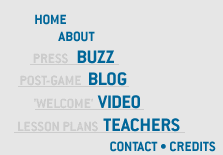LESSON ONE FOR STUDENTS:
Oil Crisis:
Get Into The Game
A global oil crisis has begun. Oil usage worldwide has increased to where the oil supply can only meet 95% of it. Begin the inquiry into the effects of less oil in our lives.

LESSON TWO FOR STUDENTS:
How Bad Can It Get?
Fuel prices rise in anticipation of when actual supplies start to run short. It's clear that there is no quick fix to the shortage. Tensions start to rise.

LESSON THREE FOR STUDENTS:
Life Is Starting To Change
Widespread changes are starting. Goods and services that depended on cheap oil are failing.

LESSON FOUR FOR STUDENTS:
Elasticity and Collapse
This lesson investigates the factors that define elasticity in relation to oil – factors such as lifestyle, geography, setting and community.

LESSON FIVE FOR STUDENTS:
Oil Dependency
Among Nations
The oil crisis has caused some nations to reconsider their foreign policy objectives – and to aggressively seek to acquire oil.

LESSON SIX FOR STUDENTS:
Food Without Oil
The impact of oil on our food supply is one of the most serious aspects of the oil crisis. Shortages are forcing many people to look for locally grown food.

LESSON SEVEN FOR STUDENTS:
Breakdown
Governments have been hit as hard as anyone by the crisis, leading to the existence of red and green zones in cities and refugee camps in the country.

LESSON EIGHT FOR STUDENTS:
Preparation and Community
With problems piling up and the government unable to help, many communities across the nation are turning inward for solutions.

LESSON NINE FOR STUDENTS:
Lessons Learned
Now that the crisis has stabilized, how do we go forward? How do we balance our desire for energy's benefits with the risks and costs of procuring it?

LESSON TEN FOR STUDENTS:
Your World Without Oil
Help out the World Without Oil team. Script and deliver your own citizen report that communicates what is happening to you in the crisis.

In May 2007, over 1,800 people of all ages combined imagination with insight to create World Without Oil (WWO), a realistic simulation of the first 32 weeks of a global oil shortage chronicled in 1,500 personal blog posts, videos, images and voicemails. You can use this collaborative grassroots simulation to engage with questions about energy use, sustainability, and the role energy plays in our economy, culture, worldview and history.
World Without Oil was an alternate reality game – when submitting their stories, its players pretended the oil crisis was really happening. We encourage you to do the same: to get "in game" and act to make the crisis seem real. Each day you can explore a World Without Oil, and prepare your own "in-game" stories that you can contribute to the WWO online archive.
Has Your Teacher Assigned a Lesson?
Go right to it using the links at right in the orange bar.
Using These Lessons as Self-Study
When planning your self-directed World Without Oil investigation, consider:
- Modular. The ten lessons are modular – use them all or select a subset to fit your interests.
- Rearrangeable. The game is designed to evoke reactions. Feel free to rearrange the lesson order day to day to pursue issues of interest to you.
- Evaluations. If you keep a personal journal or blog to record your reflections, it will be useful for others who may wish to evaluate your study progress.
- Customizable. The WWO archive contains citizen reports that cover a vast number of topics. We encourage you to search the archive for player-created stories on topics that fit your course goals. Use the Internet Archive to view June 1, 2007, the game's last day, and scroll down to the tag cloud.
Lesson Format
Lesson Instructions have this structure:
- Set the Stage – We present one or two stories from WWO to give you the gist of the latest overall events in the oil crisis.
- Take Action – How will these events change your life and the lives of your family and the world around you? What risks to quality of life do you see? What will you personally do in response to these risks? We ask you to analyze the causes of the latest events and the potential short and long term effects. You can compare your responses to those of selected WWO players.
- Lesson Activity - Examine a specific topic that gives context and helps you gain a greater understanding of the latest events in the oil crisis.
- Reflect - Now armed with a greater understanding of the situation, react in game (as though the latest events were really happening). Topics for your reflection should revolve around the daily event - either as your reaction, an extended explanation, or an examination of the impact and effects. You have great freedom in media choice to record these reflections, to suit the resources available to you. If you create your reflections online (as blog posts, videos, podcasts, photographs, drawings, texts and so on) you can submit them to the World Without Oil website for eventual inclusion in the WWO archive.
- Take It Further - Although World Without Oil is fiction, it is very closely connected to real-world events, topics and themes. Each lesson includes links to additional material in the WWO archives and other related resources for you to explore between sessions. The idea is to extend your "in-game" point of view beyond the class session, so that you continue to apply its lens of inquiry to your life and the world around you. We encourage you to record the relationships you find in your life to oil and energy, and record these discoveries in your journal or blog.
We also link you to actual "missions" from WWO, so that you can take on tasks or attempt to solve problems just as players in the game did.
Requirements: Accessing the Archive
To use these lesson plans, you should have free access to the Internet. To go straight into the player stories in the World Without Oil game, start at WWO in the Wayback Machine at the Internet Archive.
The WWO stories are not stored on the World Without Oil site; players uploaded them to their blogs, to YouTube, to Flickr and so on. So you must have access to these sites to experience many of the stories.
If you find a link that's broken or blocked, try the permanent web snapshot at the World Without Oil Archive at Archive.Org.
Subjects and Methods
The WWO lesson plans are cross-disciplinary and relate to American History, World History, Geography, Current Events, Economics, Government, Humanities, English, and more. Methods include inquiry-based learning, narrative-driven learning, collaborative learning, multimedia content creation, and media literacy. Outcome: we hope to give you an in-depth understanding of the role that energy has played in our economy, culture, policy and identity, its connections to our lifestyle and affluence, and ways to evaluate its role in our future. WWO is also a fascinating experiment in open-sourced game design!
Suggestion: Blog
Each lesson includes a section where we ask you to reflect upon the day’s theme. Blogs are well-suited to this activity: you can prepare reflections as text, images, videos or audiofiles. Blogging echoes the way in which the participants in the original game shared their ideas.
Blogs are available for free from LiveJournal, Vox, WordPress, Edublogs, Blogspot, Ning and many other blog hosts. You can start your own blog (most require an e-mail address) or set up a blog with the help of your teacher.
Upon completion of your WWO study, we encourage you or your teacher to submit the URL of any material you've created, using the "Tell Your Story" form, for eventual inclusion in the WWO site archive.
Credits
Lesson plans by Dan McDowell and Ken Eklund
![]()
![]()
![]()
![]()
![]()
![]()
![]()
![]()
![]()
![]()







